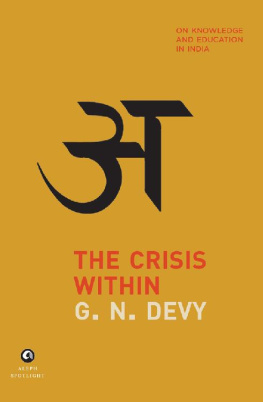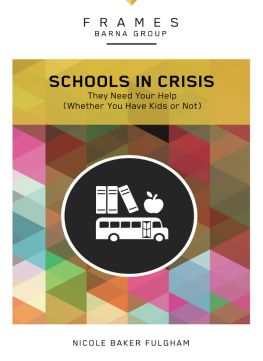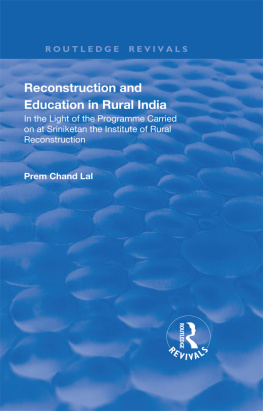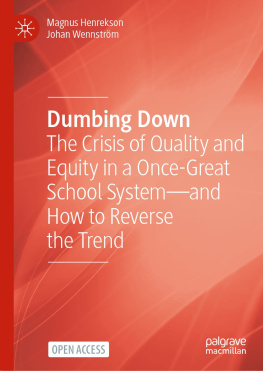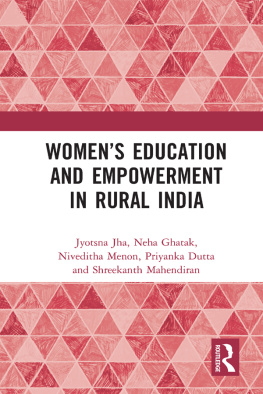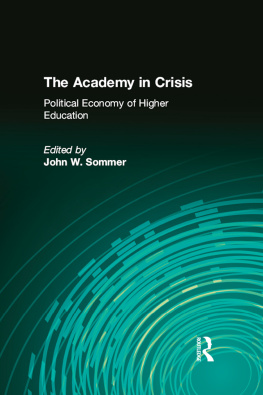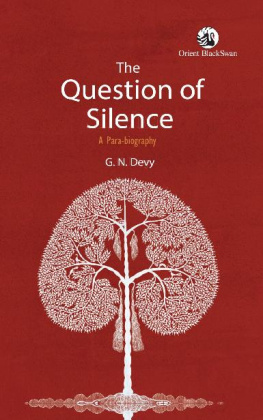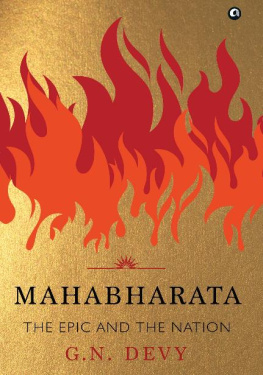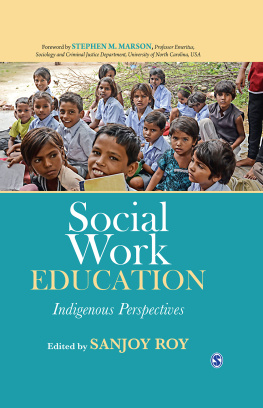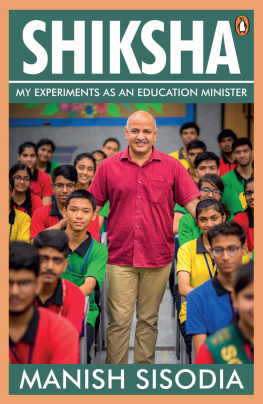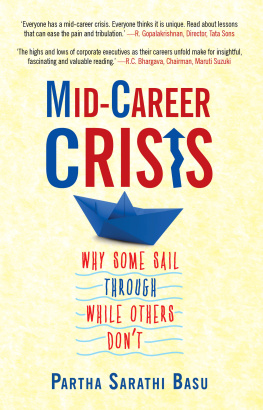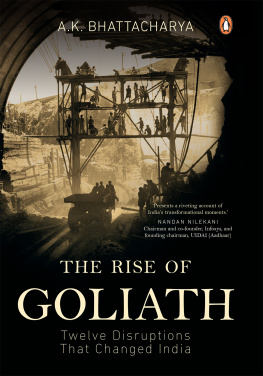THE CRISIS WITHIN
Books by G. N. Devy
Critical Thought
After Amnesia
In Another Tongue
Of Many Heroes: An Indian Essay in Literary Historiography Indian
Literary Criticism: Theory and Interpretation
A Nomad Called Thief: Reflections in Adivasi Silence
The G. N. Devy Reader
Edited by G. N. Devy
India Between Tradition and Modernity (co-editor)
Painted Words: An Anthology of Tribal Literature (editor)
{133}
THE CRISIS WITHIN
ON KNOWLEDGE AND EDUCATION IN INDIA
G. N. DEVY
ALEPH BOOK COMPANY
An independent publishing firm
promoted by Rupa Publications India
First published in India in 2017
by Aleph Book Company
7/16 Ansari Road, Daryaganj
New Delhi 110 002
Copyright G. N. Devy 2017
All rights reserved.
The author has asserted his moral rights.
The views and opinions expressed in this book are the authors own and the facts are as reported by him, which have been verified to the extent possible, and the publishers are not in any way liable for the same.
No part of this publication may be reproduced, transmitted, or stored in a retrieval system, in any form or by any means, without permission in writing from Aleph Book Company.
ISBN: 978-93-83064-10-6
1 3 5 7 9 10 8 6 4 2
This book is sold subject to the condition that it shall not, by way of trade or otherwise, be lent, resold, hired out, or otherwise circulated without the publishers prior consent in any form of binding or cover other than that in which it is published.
For Rashmi,
the light of my family
CONTENTS
~
INTRODUCTION

The present century is often described as the knowledge century. We cannot be sure if this tag will stay valid until the end of the century or whether future historians will characterize this period as the Age of Knowledge as has been the case with the Dark Ages or the Age of Reason in the past. Perhaps the description sums up the euphoria resulting from the information explosion and the technologies surrounding the exponential growth in the information generated every passing second. It is possible that this epithet may not be sufficiently adequate for characterizing our time. The century has also been forecast to be the era of water wars, an age of deathless humans, an epoch of ecological termination, and the moment for an irreversible merger of the physical and the digital. The knowledge century label is open to discussion and is not incontestable. Indeed, self perceptions of human civilizations can change quite radically over a relatively short temporal span. But if at all the present century can be viewed as a unique era in human history, marking a new kind of engagement with what is considered knowledge, it would be interesting to reflect on where India stands in relation to this new turn in history.
Numerically speaking, in 2017, nearly one in every six human beings is an Indian. This number, a staggering 1.34 billion (134 crores) out of an estimated world total of 7.4 billion (748 crores), is unprecedented in scale, and is next only to the Chinese population1.38 billion (138 crores). In 2011, the year in which the last census was carried out, Indias population stood at 1.21 billion, while the Chinese population counted a year earlier was 1.31 billion. In a few years, India will surpass Chinas population level. Also, the demographic proportion of the younger population in India at present is the largest ever in Indias history, with more than half of the population below the age of twenty-five. Of the entire global population, nearly one in every twelve humans is a young Indian for whom meaningful education is the most assured means of finding a decent livelihood.
Education, knowledge production and research leading to widening of the horizons of thought and imagination, therefore, ought to be seen as important concerns of our time. The figures mentioned here provide only a very broad quantitative measure of the challenge before us. Considerations of how and how much knowledge is produced, how it is transacted and how it is responding to social inequalities and ecological disconnect add to the vastness and complexities involved in a study of knowledge and education in India. This book about the status of education in India, particularly higher education and the forms of knowledge that it pursues, is a modest attempt at unravelling some of the complexities. It is not intended to be a comprehensive report on education in India, nor does it hope to provide an exhaustive analysis of our knowledge status. Though knowledge and education are its twin central themes, I must at once clarify that this is not an academic book. Having spent close to half a century in and around universities, and having elsewhere presented academic research and essays, I thought it not too inappropriate to present my observations on the theme through a reflective statement. I do not intend to present a position or positions in it. Quite often, analytical studies have a purely subjective weave as their flip side, a tacit class bias presented as objective culture-critique. To the extent possible, I have avoided such analysis. I would therefore like to describe this book as the reflections of a person for whom knowledge and education have been serious concerns for several decades.
When I began working as a young researcher in literary studies in the early post-Independence years, the colonial experience was the obsessive interest of the day. Most forms of formal knowledge, scientific disciplines and social sciences were seen as having originated in the colonial transfer of knowledge. Scholarly debates revolved around the question of acceptance or rejection of these forms of knowledge. These debates were happening in several disciplines, if not all of them, ranging from history to literature, architecture to aesthetics; but invariably the reference point was the knowledge of the colonial mint.
During the 1980s, the interest started shifting to discussion of disparities inherent in every intellectual transaction between the colonizing Western cultures and the post-colonial societies. These discussions were fascinating and produced several works of great brilliance. They gained in significance as similar discussions had been taking place in other post-colonial cultures. In Western intellectual circles too colonialism and post-colonialism acquired as much centrality as the Cold War and imperialism had enjoyed earlier. I have chosen to overlook in this book many of the valuable insights generated over the decades in both these phases as they are by now well-settled in the arena of the history of cultural relations. Given, however, the significance of the enormous amount of descriptive and analytical studies that those two moves produced, both within India and outside, I begin by briefly alluding to some of the iconic period-statements in the next section, before moving to the discussion of the more contemporary, and no less significant phenomena having a profound bearing on the question of knowledge and education in India. These phenomena include the rapidly sinking fortunes of natural memory, technology of knowledge incubation and knowledge reception, and the sanitization of knowledge effected through several exclusionslinguistic, ethnic and epistemic. This book, therefore, reflects on the condition and crisis of knowledge as much as it is, by implication, about the condition and crisis of our democracy. In order to analyse the present status of knowledge in India and the problems at the heart of Indias higher education, this book will focus on four important elements: first, the idea of knowledge in Indian tradition(s); second, the trajectory of memory; third, the patterns of social exclusion and their effects on knowledge construction; and finally, the impact of technology on the forms of knowledge.







